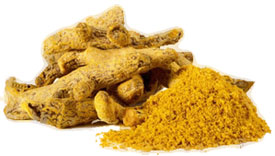Turmeric Health Benefits - Medicinal Properties of Turmeric
 Turmeric is one of nature's most powerful healers. The active ingredient in turmeric is curcumin. Turmeric has been used for over 2500 years in India, where it was most likely first used as a dye. The medicinal properties of this spice have been slowly revealing themselves over the centuries. Long known for its anti-inflammatory properties, recent research has revealed that turmeric is a natural wonder, proving beneficial in the treatment of many different health conditions from cancer to Alzheimer's disease.
Turmeric is one of nature's most powerful healers. The active ingredient in turmeric is curcumin. Turmeric has been used for over 2500 years in India, where it was most likely first used as a dye. The medicinal properties of this spice have been slowly revealing themselves over the centuries. Long known for its anti-inflammatory properties, recent research has revealed that turmeric is a natural wonder, proving beneficial in the treatment of many different health conditions from cancer to Alzheimer's disease.
Turmeric Health Benefits
Turmeric (curcumin) is considered a symbol of prosperity and a whole body cleansing herb in India's traditional ayurvedic medicine science. Medically, it was used as an aid for digestive disturbances and as a treatment for fever, infections, dysentery, arthritis, jaundice, and other liver problems.
In recent years, turmeric health benefits have captured the attention of Western scientists and herbalists. However, this herb held a place of honor in India's traditional Ayurvedic Medicine because they have always known the magical medicinal powers of turmeric.
Health Benefits of Turmeric
- It is a natural antiseptic and antibacterial agent, useful in disinfecting cuts and burns.
- It speeds up wound healing and assists in remodeling damaged skin. It is therefore advised to mix 1 teaspoon of turmeric powder in hot milk for fast recovery of internal injury to body muscles.
- When combined with cauliflower, turmeric has shown to prevent prostate cancer and stop the growth of existing prostate cancer.
- Turmeric prevented breast cancer from spreading to the lungs in mice.
- It may prevent melanoma and cause existing melanoma cells to commit suicide.
- Turmeric reduces the risk of childhood leukemia.
- Turmeric is a natural liver detoxifier.
- Turmeric may prevent and slow the progression of Alzheimer's disease by removing amyloid plaque buildup in the brain.
- Turmeric may prevent metastases from occurring in many different forms of cancer.
- It is a potent natural anti-inflammatory that works as well as many anti-inflammatory drugs but without the side effects.
- Turmeric has shown promise in slowing the progression of multiple sclerosis in mice.
- Is a natural painkiller and cox-2 inhibitor.
- It may aid in fat metabolism and help in weight management.
- Turmeric has long been used in Chinese medicine as a treatment for depression.
- Because of its anti-inflammatory properties, Turmeric is a natural treatment for arthritis and rheumatoid arthritis.
- Boosts the effects of chemo drug paclitaxel and reduces its side effects.
- Promising studies are underway on the effects of turmeric on pancreatic cancer.
- Studies are ongoing on the positive effects of turmeric on multiple myeloma.
- Turmeric has been shown to stop the growth of new blood vessels in tumors.
- Turmeric health benefits for the skin: Turmeric may help in the treatment of psoriasis and other inflammatory skin conditions.
How is turmeric beneficial for health?
The health benefits of turmeric lie in the active ingredient called curcumin. This powerful compound gives turmeric its therapeutic benefits, its yellow color, and its pungent flavor. More specifically, curcumin harbors antioxidant, anti-inflammatory, antibacterial, stomach-soothing, and liver and heart-protecting effects.
Turmeric as an anti-cancer agent
Laboratory studies indicate that curcumin has anti-cancer activity. More specifically, it destroys some types of cancer cells. For example, in the laboratory, curcumin kills cultures of human leukemia cells. This action may be due to turmeric antioxidant properties or some other anti-cancer activity. Needless to say, more research is needed to determine turmeric benefits as a potential cancer agent.
How to take turmeric?
Turmeric can be taken in either powder or pill form. It is available in pill form in most health food stores, usually in 250-500 mg. capsules. Once you start using turmeric on a regular basis, it's fun to find new ways to use it in recipes.
Who should not take turmeric?
Turmeric should not be used by people with gallstones or bile obstruction. Though turmeric is often used by pregnant women, it is important to consult with a doctor before doing so as turmeric can be a uterine stimulant.